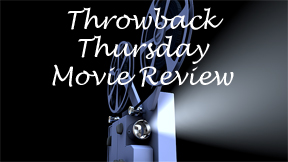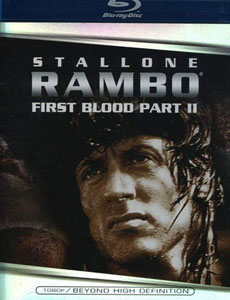“Rambo: First Blood Part II” (1985), following the 1982 masterpiece “First Blood,” is generally seen as the point at which “Rambo” turns into a dumb action series, but that’s unfair. Certainly, it has all the stereotypes of over-the-top Eighties spectacle such as the Russian helicopter’s single bomb blowing up an entire waterfall and hillside, Rambo (Sylvester Stallone) unfurling explosive arrows that blow people up on impact, and the meme-worthy shot of muscleman Rambo letting loose with his machine gun and a savage yell.
The anti-war saga continues … with more war
But thematically, and even in terms of plotting, this is another tight entry in the anti-war saga about warfare. A decade and a half after the Vietnam War, Rambo – agreeing to a deal with mercenaries led by Murdock (Charles Napier), but only trusting Trautman (Richard Crenna) — returns to get photographic proof of American POWs. The USA reneged on reparation payments in 1972 that would’ve freed the POWs, who have been used as slave labor ever since.
In a nice continuation of the dishonesty and insanity of the US government’s approach in Vietnam, the goal of Murdock (and his off-screen superiors) is to fail to find evidence of living POWs and thus appease the families demanding action. (If Rambo comes back with photos, they’ll “accidentally” lose the photos.) Rambo – too good at his job – finds a living POW, Banks (Andy Wood).

“Rambo: First Blood Part II” (1985)
Director: George P. Cosmatos
Writers: David Morrell, Kevin Jarre, Sylvester Stallone
Stars: Sylvester Stallone, Richard Crenna, Charles Napier
And now it’s on. In one of “RFBP2’s” best moments (outside of Rambo emerging from a mud wall to kill an enemy), the Russians – working with their Communist allies in North Vietnam – order the captive Rambo to draw his team to their location, via the radio. He uses the opportunity to tell Murdock he’s coming for him.
In some ways, director George P. Cosmatos’ sequel is a bigger and more explosive version of “First Blood’s” structure. A lot of Trautman’s dialog is set-ups for one-liners in the vein of the original’s “Don’t forget one thing … a good supply of body bags.” In these zingers, he tells Murdock that Rambo is “at home” in the jungles of Nam, and that Murdock’s scheme failed to account for one thing: “Rambo.”
But this time, Rambo doesn’t have to work alone in the jungle (southern Mexico serving as an evocative stand-in for Nam). His ally is Co (the beautiful Julia Nickson), a South Vietnamese agent who is a pretty great character despite fitting the clichés of both a love interest and the spark that pushes Rambo to the next level of violence.
Missing some Morrell elements
“RFBP2” – written by Stallone and James Cameron (working from Kevin Jarre’s story) – unfortunately doesn’t include some neat elements that can be found in the novelization by David Morrell, who launched this franchise with the “First Blood” novel in 1972. In the book, we learn that one of the Vietnamese officers is Tay (George Cheung, replacing an uncredited actor), the same one who cuts Rambo’s chest with a knife in the Nam flashbacks in “First Blood.”

The film also skims over Rambo packing C-4 into the shafts of his arrows. This is how the arrows become explosive, and how he blows up Tay. So a very personal bit of revenge turns into an example of Eighties action silliness. Fans of Rambo’s gear will also enjoy Morrell’s book, which goes into detail about the history of bows leading up to the modern compound bow, which can kill enemies without making noise (except when the arrow shafts are packed with C-4).
“RFBP2” keeps up the saga’s theme of the US government’s dishonesty, but at the very end, Rambo says he loves his country, and he wishes it would love him back. This is something that Reagan latched onto (along with the “patriotism” of Bruce Springsteen’s “Born in the USA” – the prez had a problem with recognizing critiques), and Stallone perhaps included the line so he wouldn’t be thought to be making unpatriotic films.
Even among real Vietnam veterans treated as badly as Rambo, there are those who claim to love their country, and Stallone no doubt had that cohort in mind.
Still, we can see there’s no reason for Rambo to be loyal to the USA after the events of these two films – and plenty of reason not to be. He’s a man without a country, and while this reinforces “First Blood’s” theme rather than offering something new, it remains powerfully tragic. Dumb action franchise? Not quite yet.

